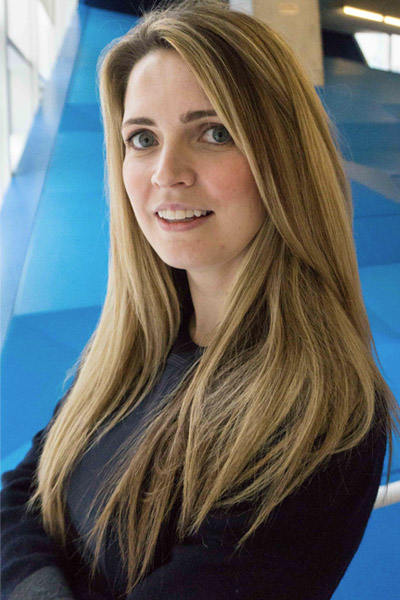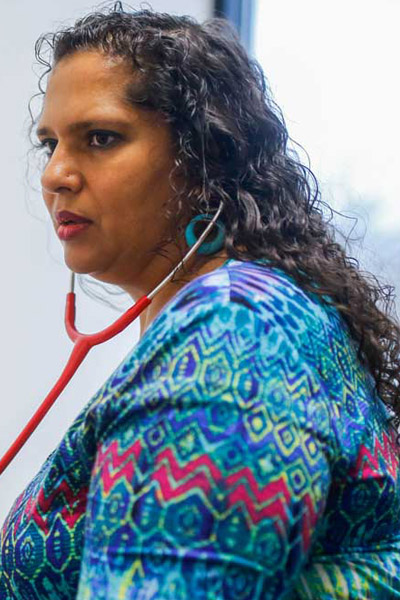A spotlight on research, teaching, & community: Professors Oona St. Amant & Manavi Handa


In celebrating The International Year of the Nurse and Midwife 2020 (external link) we are profiling two professors at the Faculty of Community Services: Oona St. Amant of the Daphne Cockewell School of Nursing and Manavi Handa of the Midwifery Education Program. Both have taken an interesting path to their current roles, including strong community connections. Part of those connections includes a passion to illuminate and elevate often unseen work of practitioners and patients. St Amant, in her research into the world of nursing and care providers, and Handa in her work with her clinic and students, both bringing a social justice and equality lens to their work as they highlight the value of those that are often overlooked.
Early influences and education
St. Amant began at the University of Ottawa, working as a research nurse in HIV care. Her MScN at the University of Western Ontario looked at dementia care in families, and how—in addition to their professional roles—nurses are also being called on to provide nursing care for relatives. As a PhD student, she compared how we look at international volunteer work with how we care for aging relatives at home. She found that some of the challenges created by our colonial international medical system paralleled with under-valued forms of care domestically. In further research, she looks at how society under-values the contributions of migrant nurses and those who provide care to people with substance use challenges.
Handa began as a midwifery student at Ryerson and graduated almost exactly 20 years ago. While continuing midwifery practice, she did her master’s degree in bioethics at the University of Toronto and shortly after became a professor in the Ryerson Midwifery Education Program. Her academic, clinic and advocacy work have focused on making maternal health care available to the underinsured and expanding the full range of reproductive health options for midwifery clients, including abortion, and having those options equally available across the province of Ontario. Her research has led to better funding for doctor-midwife relationships and exploring ethics in midwifery. “A significant part of this includes recognizing the outcomes midwives bring to mothers, parents, families, and babies such as lower rates of intervention, higher rates of breastfeeding and client satisfaction,” said Handa.
Both St. Amant and Handa aim to elevate the efforts of nursing and midwifery professionals respectively. “Nurses deserve to have someone look at what they do, and how they do it, from a nurse’s perspective,” says St. Amant, referring to her work with nurses who care for aging relatives. “Often we approach this from just the client point of view, but I think to serve both the client and care provider we also need to look at this through the lens of a nurse and nursing science.” Similarly, Handa acknowledges her fellow midwives. “We have a body of practitioners with rich knowledge who are able to deliver a full and broad range of reproductive health services—yet we still need to fight for pay equity, and go overseas for graduate work in our field..”
St. Amant’s research brings a focus to the care we value, why, and how it affects nurses. “We place a disproportionately high value on international volunteer work abroad which is often temporary or time-limited and may disrupt existing local health care systems, affecting nurses and the communities they work in overseas. At the same time, we undervalue other forms of unpaid care work, like family caregiving. Senior care for a relative is no less valid or important nursing work than any other,” she explains. “We also see, when we look at dementia care and families, nurses in families are prepared to and often rise to the occasion. And it works until the boundaries get blurred and then the ‘double duty’ (external link) sets in and the stress can take quite a toll on that nurse.”
Handa co-founded the clinic, West End Midwives (external link) , with four Ryerson midwifery graduates, Ren Barret, Pam MacInnis, Elaine Ho, and Nicole Bennet. She notes, “we opened the clinic with the goal of serving marginalized communities in some of Toronto’s most impoverished neighbourhoods.” This practice has grown and now includes 10 more Ryerson graduates. “One of my favorite parts of teaching is watching the learning process. We are a very skilled profession, and I am very proud to call many former students colleagues.” Due to Handa’s research looking at the costs savings midwifery care brings to our health care system, the Ontario government expanded funding for consults with obstetricians and other physicians for clients without OHIP or legal immigration status. “This contributed to improving midwife-doctor relationships and also led to expanding the benefits we can provide to non-insured clients around the province. When you look to see the good we do - the evidence and the outcomes are there.”
“From an outcome perspective, midwifery care has been shown to be associated with less intervention and positive outcomes for pregnant people and babies. Midwives also have a significant positive effect on things like breast/chestfeeding which leads to improved cognitive development, immune system improvements, and reduced infections in children. Those positive outcomes are very hard to quantify and the long term benefits of midwifery are often overlooked,” said Handa.
“Our context affects how we think about health care and care providers,” says St. Amant. “In my more recent work, I am interested in how some of our views on care work and substance use. Family members are often left to provide care in hidden spaces, carrying with them shame and stigma. This form of care work is often socially overlooked. Nurses play an important role in supporting families, and have the skills and knowledge to therapeutically connect with families.”.”
“Pay equity is very important,” says Handa. “Midwives had to go to the human rights tribunal to fight for this. We voted unanimously to do it, and the ruling was in our favour. The work we do matters.”
“Nurses are highly skilled knowledge workers,” said St. Amant. “They are licensed, standardized, and we have nursing scientists who constantly look for ways we can improve our processes, practices, and standards of care, and nurses should be respected for that. In the context of COVID-19, nurses are enduring the same risks as their peers in practice - and pay is not determined by risk”
Thank You
Both also have some colleagues they want to thank for helping them get to this point.
“I built my thesis on the work of Catherine Ward-Griffin, RN, Ph.D., (external link) who coined the term ‘Double Duty Nursing.’ She really made a difference to me,” St. Amant acknowledges.
“Some of my main instructors, when I was a student, have now become colleagues and continue to be my mentors while treating me as an equal, including Vicki Van Wagner, Elizabeth Allemang, and Mary Sharpe.
Handa and St. Amant also both highly recommend pursuing their professions. “It is truly a privilege to be part of this profession, that is rooted in autonomy and empowerment, and providing a full range of reproductive health care. While things can be unpredictable and you can be called out in the middle of the night, for the most part, you get to be on the ‘positive’ outcome side of health care. We are a growing profession in Ontario, and the future is bright. We’ve come a long way in 20 years and I hope that we have more midwives, more clinics, and eventually our own graduate education program here at Ryerson,” said Handa. “As norms change, hopefully, our profession will change to reflect more diversity, more gender inclusivity - care for trans folks getting pregnant, midwives transitioning, and cis men becoming midwives and much more racial diversity. Historically, midwifery has not represented the racial diversity of our society. We started out very small in numbers, but midwifery is rapidly growing in size and diversity and welcoming more people into our profession.”
“Nursing is a great career,” says St. Amant, “the possibilities are endless. Nursing is truly a caring profession built on evidence and science. Sometimes what we do is unseen, but you’ll never wonder if you made a difference in this line of work.”